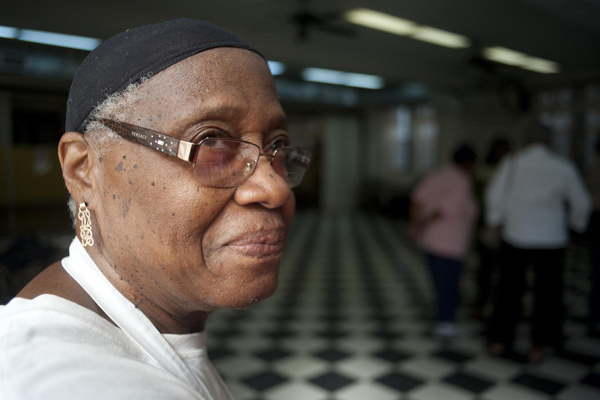
Photo by: Elbert Chu
Every Tuesday, Vera Burnett cooks for up to 250 people at Bethany United.
On Tuesday, Sept. 13, one reporting class from the CUNY Graduate School of Journalism sent its students out to talk to patrons and providers at a dozen food pantries and kitchens in Brooklyn. Here is one of the scenes they found:
Every Tuesday, Vera Burnett cooks for up to 250 people in need, inspired by her mom’s big dinners for family and friends. Her son Nevel is unemployed, but he is not here to eat.
Every week for over a year, Nevel Burnett, 48, has served food at Bethany United Methodist Church’s soup kitchen in Brooklyn, where his mom is the boss. With a team of 24 volunteers, they cook and serve enough food for people with ingredients donated by City Harvest and the Food Bank. Meanwhile, Burnett just wants a job with health insurance.
“There’s not many jobs out there for pressmen these days,” says Burnett. He used to run the printing presses a book publishing house. Burnett’s company laid him off in 2009. “I’m not good with technology,” says Burnett. He has no email or mobile phone.
“Working at the soup kitchen helps people and keeps my mind sharp,” says Burnett. He said if his mom were not in Brooklyn, he would have left New York to find work. They are both long time members of Bethany.
“We’ve seen a lot of new faces,” says Mrs. Burnett, 82. “We don’t ask them why they come, we just give them a hot meal.”
Preparations at Bethany begin on Monday. The volunteers, mostly Caribbean grandmothers with quick smiles, prep food all day. On this Monday, they cleaned fish until 7 p.m. On Tuesday, the kitchen starts cooking at 8:30 a.m. By quarter after noon, a line of people eagerly wait 15 minutes for opening.
Once open, there is a bottleneck at the door for registration. That done, the hungry crowd filters down into a fellowship hall that features checkered linoleum and ceiling fans spinning lazily overhead. A prayer is said to bless the food. Today’s meal is whiting fish or salmon, in gravy with a side of carrots and green beans.
At 1:00 p.m. the nine long tables are packed. A man stands and makes a scene. Mrs. Burnett charges over and says, “If you come in hot, I know how to cool you down.” The man finishes his meal.
By 2 p.m. the rush is over. People don’t talk much to each other, except about the meal, which is finished with cake. Around 2:10 p.m. only a handful of people loiter. A little after 2:30 p.m. volunteers sweep and mop.
At 2:50 p.m. Pinkee Hardley, who helped people sign-in, says with a wave of the sign-in papers, “One hundred eighty six today.” Hardley has volunteered here for five years. She said, “Some shelters have closed down. It’s hard to keep up.”
At 3:05 p.m. a truck with the green and orange City Harvest logo rolls in front. Volunteers bring in a red shopping cart full of round cabbage heads wrapped in plastic. The staff sort and store cabbage in large stainless refrigerators for next Tuesday.
Today, Burnett had an interview scheduled with a security company, but the company canceled it. Burnett says he’s not discouraged: “I keep working here and believing there’s going to be a better day.”
Read the rest of our ‘Lunchtime, Tuesday’ reports:
At Brooklyn Pantries & Kitchens, New Need is Getting Old
Despite Economic Slowdown, Food Prices Rise In New York
Bushwick: ‘There are kids out there who are hungry besides us.’
Bed-Stuy: ‘I have seen less produce, less food … but more people.’
Williamsburg: ‘Normal families need food. This is ridiculous.’
Midwood: ‘They can come into a store that’s neat and feel good about it.’
Bushwick: ‘I see a lot of older people come now.’
Crown Heights: ‘For two weeks last month, we didn’t have any food at all.’
Bed-Stuy: ‘We know the importance in recognizing the dignity of the people.’
Sheepshead Bay: ‘It’s painful and it’s embarrassing, you know?’








